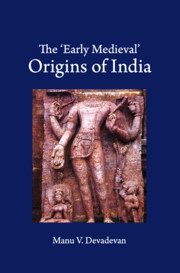Book contents
- Frontmatter
- Dedication
- Contents
- List of Tables
- List of Maps and Figures
- Acknowledgements
- 1 Introduction
- I INSTITUTIONS
- 2 State Formation and Its Structural Foundations
- 3 From the Cult of Chivalry to the Cult of Personality: The Seventh- Century Transformation in Pallava Statecraft
- 4 Changes in Land Relations and the Changing Fortunes of the Cēra State
- 5 Temple and Territory in the Puri Jagannātha Imaginaire
- II IDEAS
- 6 Svayaṃbuddha's Predilections: The Epistemologies of Time and Knowledge
- 7 Bhāravi and the Creation of a Literary Paradigm
- 8 Knowing and Being: The Semantic Universe of the Kūḍiyāṭṭaṃ Theatre
- 9 The Invention of Zero and Its Intellectual Legacy
- III IDENTITIES
- 10 The Evolution of Vernacular Languages: A Case Study of Kannada
- 11 Religious Identities in Times of Indumauḷi's Grief
- 12 Caste, Gender, and the Landed Patriarchy
- 13 The Making of Territorial Self Consciousness (with Particular Reference to Kaliṅga)
- Bibliography
- Index
9 - The Invention of Zero and Its Intellectual Legacy
Published online by Cambridge University Press: 02 May 2020
- Frontmatter
- Dedication
- Contents
- List of Tables
- List of Maps and Figures
- Acknowledgements
- 1 Introduction
- I INSTITUTIONS
- 2 State Formation and Its Structural Foundations
- 3 From the Cult of Chivalry to the Cult of Personality: The Seventh- Century Transformation in Pallava Statecraft
- 4 Changes in Land Relations and the Changing Fortunes of the Cēra State
- 5 Temple and Territory in the Puri Jagannātha Imaginaire
- II IDEAS
- 6 Svayaṃbuddha's Predilections: The Epistemologies of Time and Knowledge
- 7 Bhāravi and the Creation of a Literary Paradigm
- 8 Knowing and Being: The Semantic Universe of the Kūḍiyāṭṭaṃ Theatre
- 9 The Invention of Zero and Its Intellectual Legacy
- III IDENTITIES
- 10 The Evolution of Vernacular Languages: A Case Study of Kannada
- 11 Religious Identities in Times of Indumauḷi's Grief
- 12 Caste, Gender, and the Landed Patriarchy
- 13 The Making of Territorial Self Consciousness (with Particular Reference to Kaliṅga)
- Bibliography
- Index
Summary
Intellectual life in India between 1200 and 1800 CE was substantially different in comparison with the preceding centuries. However, it was the points of emphases that caused the difference. The spheres of engagement, the categories of exploration, and the terms of debate drew upon the foundations already laid out before 1200. The commentary continued to be the preferred method of exposition, even when the descriptive form made modest beginnings in the twelfth century and gained wider acceptance from the sixteenth century onwards. This was true of logic, metaphysics, and esoteric forms of knowledge as well as the more material disciplines in science, such as architecture, medicine, mathematics, and astronomy. The advances made in mathematics and astronomy draw particular attention, as some of them had striking parallels with developments in the disciplines in contemporary Europe. This chapter makes an overview of these advances in broad outlines and accounts for them by placing them in relation to the developments in mathematics and astronomy from the vaidik times onwards. It will be argued that the progress in these disciplines did not result from teleological epistemic developments since the time of the Vēdas but were enabled by the invention of zero in the late fifth century and its increased acceptance and use between the seventh and the twelfth centuries CE.
A good place to begin this discussion is Kerala, where between the fourteenth and the nineteenth centuries, astronomers and mathematicians flourished in great numbers, studying, teaching, and producing commentaries as well as original works in the two related disciplines. Their work is now somewhat patronizingly called the Kerala School of Mathematics. George Gheverghese Joseph observes that ‘the period between the fourteenth and seventeenth centuries marked a high point in the indigenous development of astronomy and mathematics’. This is by no means an overstatement, but Joseph's argument that this phenomenon was noticed only in Kerala appears to be tenuous. His claim that ‘the picture about the rest of India is somewhat patchy’ is hard to maintain, as the picture we gather from a few other parts of the subcontinent have something else to tell. Joseph is among the most important proponents of the thesis that there existed a distinct school of mathematics in Kerala.
- Type
- Chapter
- Information
- The ‘Early Medieval' Origins of India , pp. 254 - 278Publisher: Cambridge University PressPrint publication year: 2020



